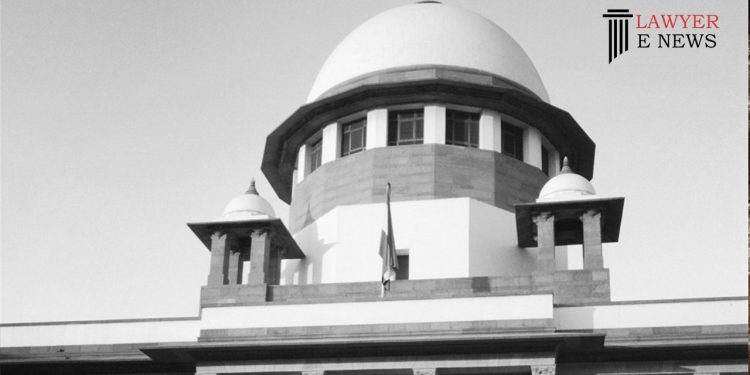Constitutional Validity of the Tamil Nadu Highways Act, 2001 Upheld : SC

The Supreme Court, on 9th May 2023, upheld the validity of the Tamil Nadu Highways Act, 2001, stating that its provisions cannot be held discriminatory or arbitrary when compared with the Right to Fair Compensation and Transparency in Land Acquisition, Rehabilitation and Resettlement Act, 2013.
Subject: Constitution of India, 1950 – Article 14 – Tamil Nadu Highways Act, 2001 – Right to Fair Compensation and Transparency in Land Acquisition, Rehabilitation and Resettlement Act, 2013 – Comparison between two State enactments – Validation Act of 2019 – Repugnancy between State and Central legislation – Presidential assent under Article 254(2) – Discrimination – Arbitrary discretion – Social impact assessment – Timelines – Extension of period – Legislative power – Land acquisition – Compensation – Procedural safeguards.
Brief Facts: The State of Tamil Nadu had passed three Acts for land acquisition – Tamil Nadu Highways Act, 2001, Tamil Nadu Industrial Areas Development Act, 1965 and Tamil Nadu Acquisition of Land for Harijan Welfare Schemes Act, 1978. The validity of these Acts was challenged in various writ petitions filed before the Madras High Court. The High Court had upheld the validity of the Acts, but the matter was taken to the Supreme Court. The present judgement only deals with the challenge to the Tamil Nadu Highways Act, 2001.
Key Observations:
– The Court held that the question of comparing the Tamil Nadu Highways Act, 2001 with the Right to Fair Compensation and Transparency in Land Acquisition, Rehabilitation and Resettlement Act, 2013 would not arise, as the former was protected by the assent given by the President of India under Article 254(2) of the Constitution.
– The Court observed that two laws enacted by two different governments and by two different legislatures cannot be read in conjunction or by comparison for the purpose of finding out if they are discriminatory, and that Article 14 of the Constitution does not authorize the striking down of a law of one state on the ground that, in contrast with a law of the Centre or of another state on the same subject, its provisions are discriminatory.
– The Court further noted that the absence of temporal restrictions in the Highways Act may not be reason enough to invalidate it, as the very premise on which the Highways Act was enacted was to cut down on time-consuming processes.
– The Court observed that a particular instance or a stray case, involving some delay in the acquisition of land under the Highways Act, may have to be dealt with on its own individual merits but that would not be sufficient in itself to invalidate the legislation itself.
– The Court also observed that there is no possibility of the State of Tamil Nadu exercising arbitrary discretion in adopting one legislation or the other for the purpose of acquiring lands, as sections 3, 7 and 11 of the Validation Act of 2019 expressly exclude the operation of the Right to Fair Compensation and Transparency in Land Acquisition, Rehabilitation and Resettlement Act, 2013 for the purposes contained in the State Acts which stood revived owing to the assent of the President of India.
The Supreme Court dismissed the appeals and upheld the validity of the Tamil Nadu Highways Act, 2001, stating that its provisions cannot be held discriminatory or arbitrary when compared with the Right to Fair Compensation and Transparency in Land Acquisition, Rehabilitation and Resettlement Act, 2013.
Date of judgement: May 9, 2023
C.S. GOPALAKRISHNAN ETC.vs THE STATE OF TAMIL NADU & OTHERS






